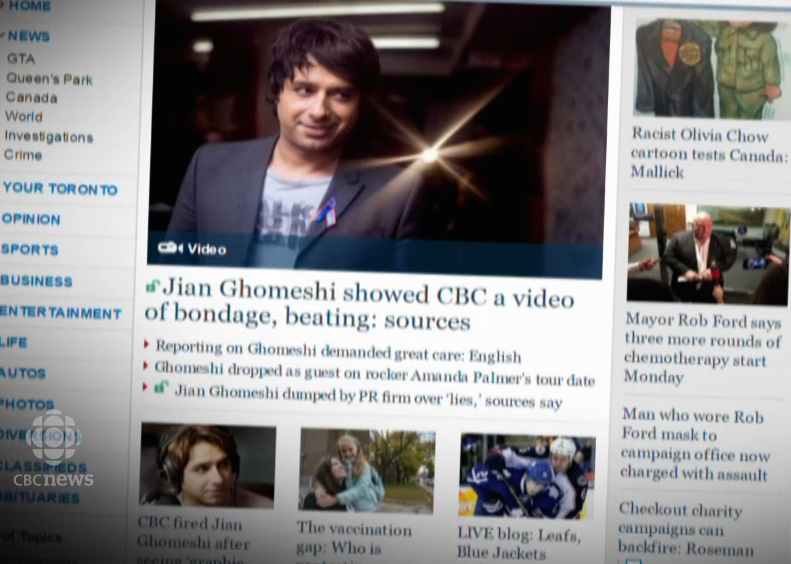I’m writing about a topic that has been written before—but not enough.
I’m writing a story about how, despite the hard work of many, we still live in a culture that needs to be told over and over that hurting people isn’t okay. A culture that blames those who have been hurt for not being tough enough to withstand cultural norms. That puts the word victim in quotation marks because we don’t care about said victim’s suffering.
In November 2014, the Canadian musician, writer and former CBC radio broadcaster Jian Ghomeshi’s name was plastered across Canadian news outlets when CBC fired the host of a popular segment called Q following allegations of sexual assault in late October 2014. Within two weeks, eight women came forward alleging they, too, had been sexually assaulted by Ghomeshi.
Ghomeshi is a Canadian celebrity, beloved by many. The events surrounding his fall from grace shocked Canadians, mostly because he seemed, well, nice.
It sounds silly, but I know when I first heard the news my immediate reaction was disbelief. Not because I particularly liked Ghomeshi (I did), but because he seemed like an ordinary guy. And if Ghomeshi was capable of abuse, then it meant that any guy—no matter how articulate, inquisitive, and well-educated—could be capable of abuse.
Ghomeshi became a symbol of a systemic problem in our society, as did the people who vehemently defended him by trying to discredit his accusers.
I felt disappointed. Threatened. Angry. Exasperated.
Being a woman already means avoiding unlit areas, particularly late at night. It means never leaving your drink unattended, constantly being sexualized, always feeling threatened. But pre-Ghomeshi, it meant being threatened by strangers in dark alleys and creeps at bars. What Ghomeshi made me realize is that nowhere is safe for women.
Misogyny is systemic.
Just over a year later, his case has finally been tried. I was hoping for justice. I was hoping for somebody to finally say: “This needs to stop.” Of course, that isn’t how his trial has gone. Instead, the first witness has already been discredited. Cue the disappointment. The anger. The exasperation. But this time, what I also felt was sadness.
Shortly after the beginning of the trial, I read an article called, Fu*k you, Jian. It argued that Ghomeshi’s legal defence implicitly defends and normalizes the abuse of women. It also did a good job of articulating the range of emotions I (and I’m sure anybody who cares about the safety of women) has been experiencing.
What the author said in the article is true; so far, the defence has been using all its air time to discredit the victims, to wash away any trace of compassion we may have for them, to shed doubt on whether or not they are really “victims.”
Discrediting the victims implicitly makes the argument that the women accusing Ghomeshi of abuse are untrustworthy, and that Ghomeshi was simply an innocent bystander, unjustly subjected to the sexually confusing signals of women. Several women, no less.
What madness! What injustice! To have one’s integrity called into question by woman after woman like that. Ghomeshi is the true victim here. If satiating the unbridled sexual thirst of a woman who is asking for it is wrong, then we don’t want to be right.
Historically, that’s proven to be a great strategy for the defence in sexual assault trials.
Works almost every time. Ghomeshi’s lawyer is doing what defence lawyers do: trying to keep their clients out of jail by instilling doubt in the jury’s mind. In this case (and sexual assault cases in general), the lawyer does that by discrediting the witnesses. The part that really sucks?
How damn easy that is for them to do. It takes very little for the defence to convince us all that the witness isn’t really a victim. That Ghomeshi isn’t really in the wrong. All the defence has to say is, Well, he may have punched the complainant in the head, but then six months later she e-mailed him so who’s really guilty here? No evidence is brought forward surrounding the crime itself, just an e-mail retrieved a few months down the line that’s completely unrelated to the actual crime being tried.
Because that’s enough.
On the subject of Ghomeshi’s role in this systemic misogyny, Fu*k you, Jian goes on to say that our culture has a sickness that allows men to treat women like objects. Groundbreaking? No. This has been said before. It’s not news. But for some reason, it still bears repeating because at a trial of a man who has been accused of sexual abuse by several women, the defence council knew that discrediting the witnesses would be a compelling argument in favour of Ghomeshi’s innocence because it plays right into that misogyny.
In other words, it still bears repeating because people aren’t listening.
Part of the reason why discrediting the witness has proven to be such an effective legal tactic in past sexual assault cases is because we have a false but dominant cultural belief in meritocracy. I say dominant, but that doesn’t mean everybody buys into the idea that we live in one.
Only those who never experienced discrimination and who have enough money to afford the necessities have the privilege of that illusion. Only a select few look at our society and see one that rewards people for their virtue and their hard work and distributes justice to those who have wronged another. Just a handful of elites can believe that they’ve earned everything they have fair and square.
When Ghomeshi’s trial lawyer points out that Ghomeshi’s accuser sent him a picture of herself in a bikini after the alleged assault, the lawyer is playing on our quiet conviction that the woman sexualized herself, wanted him, asked for him, and then turned around and accused him of sexual misconduct.
It panders to that terrifying, omnipotent belief that we get what we deserve. It equates a woman initiating a conversation with a wealthy, well-known individual with a woman holding power, with a woman being the one who gets to decide what happens with her body.
But that isn’t the case. We don’t get to decide. We have it ingrained in us from the moment we are born who we are: objects of sexual conquest. TV ads, movies, singers, our mothers, our fathers, our leaders—they all tell us to be beautiful first, and a person second.
Many women value the approval of men more than they value their own wellbeing. How can anybody say that a woman categorically consented to violence when women have been socialized to believe that our worth is determined by who wants us, irrespective of how they might want us (which, in Ghomeshi’s case, was violently)?
(Note: many people do seek out violence in a sexual context, but as anybody in the BDSM community would say, a conversation about consent should always precede a violent/sexual act.)
It’s insulting to say that women are incapable of being sexually empowered, and that’s not my point.
Yet it’s ignorant to say that we live in a society that anybody gets what they deserve, or where a woman’s consent is as simple as saying yes or no. There’s a power dynamic that goes unexamined when we assume that women have unbridled autonomy when it comes to sex, and that power dynamic shapes the experience of women every day.
If we tell Jian Ghomeshi he is not guilty of inflicting pain on other human beings because those human beings deserved it (because she sent him a picture of herself in a bikini after the fact, ergo we can’t trust her, remember?), what we are really saying is that we don’t care about women.
We’re saying we’re comfortable with human suffering.
We’re accepting a culture that inherently threatens the safety of women. These are articles that have been written before by people more qualified than I, with rhetoric more compelling and in prose more sophisticated. Yet when I read Fu*k you, Jian, I see a comment that says:
“I’m sorry but if jian’s ‘victims’ are emailing him 6 hours later saying ‘you kicked my ass last night and that makes me want to fuck your brains out tonight’ then they arent victims. They are actively consenting. Fu*k you, Lucy”
And then, I see that it needs to be said again. We need keep saying it because people aren’t listening.
Any society whose hallmarks include the systematic oppression of any individual or group is, at the very least, not a society any of us should be willing to accept silently. Whether or not the witness at this trial pursued further relations with Ghomeshi after the fact doesn’t retroactively give consent for Ghomeshi to hurt her.
We should not be at ease with women’s abuse. We shouldn’t feel like their suffering doesn’t matter. It matters a great deal. The question is whether or not we want to do anything about it.
Ghomeshi’s trial has underscored how much work there is left to do in create a free and just society. I think I’m finally ready to start, and the only way I know how to do that is by speaking up. Sometimes, that means writing long, angry replies to offensive Facebook content.
Sometimes it means sharing my copy of Milk and Honey with those unfamiliar with (intersectional) feminist art. Sometimes it means crying because my coworker told me I’m too tall and too fat. Sometimes it means wearing high heels because it’s my body and I can do what I want. It’s been said before, and now I’m adding my voice to the chorus.
And I will keep saying it until somebody listens.
Author: Mackenzie Erlank
Editor: Sara Kärpänen
Photo: Still from the Video / CBS News







Read 0 comments and reply